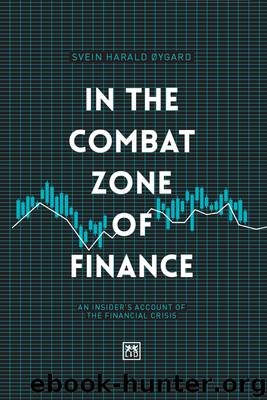In the Combat Zone of Finance by Svein Harald Øygard

Author:Svein Harald Øygard
Language: eng
Format: epub
Publisher: LID Publishing
Published: 2019-02-23T16:00:00+00:00
A dangerous spiral
In October 2012, a US hedge fund seized the proud sailing vessel Fragata Libertad from the Argentinian navy. The three-masted 102-meter-long school ship had pulled into the Ghanaian port of Tema.
Argentina also has its own Air Force One. A Boeing 737. Naturally called Tango 01. In 2010, its flight to Germany was cancelled. For fear it would be seized by creditors.
Both events had their roots in Argentina’s default a decade earlier. One hedge fund refused to settle.
Although spectacular, such cases are rare. One reason for this is the inability of creditors to seize the largest source of revenue of any state.
Its taxpayers.
Still, the soundness of the state finances sets the tone when investors assess the country, its businesses, banks and households. A state in distress can, in principle, always tax its people and its companies to solve its problems. Or it can borrow from its Central Bank, which can always print more money, creating inflation and reducing the real value of all nominal debt.
A state with financial strength, on the other hand, can support its companies, bail out its banks and help resolve the real challenges in the economy. It also serves as a symbol of discipline and the ability to get things done.
In the Icelandic collapse and the later crises in Ireland, Greece, Italy, Portugal and Spain, a fear emerged, just as it had in Sweden and Finland in 1992. A fear of a meltdown of the state finances.
With productivity growth, economic growth and population growth, the tax base of a country will grow. Future taxpayers can pay more taxes. Government investments in education, research and infrastructure may lead to future growth. It is therefore reasonable for a state to have some debt and run a slight deficit.
The debt instruments the state uses, especially government bonds, play an important role in capital markets. They are the mechanism the Central Banks use to manage liquidity, and their rate sets what by convention is called the risk-free rate.
When I was deputy minister of finance of Norway, we turned the budget deficit into a surplus. The then head of the state debt office knocked on my door.
“We must issue debt instruments,” he said.
“Why should we?” I answered. “We will never run a deficit again.”
“We need state debt instruments so that banks and companies can manage their portfolios,” he answered. “And for the Central Bank to buy and sell to inject and withdraw liquidity from the markets.”
“And to set the risk-free rate,” he continued. “How else can we calculate the WACC?”
WACC is an acronym meaning the weighted average cost of capital, a metric used by many financial analysts when comparing project returns and project costs. The calculation starts with the interest rate on risk-free debt, which is typically equal to the interest rate on government debt. Then additions are made to reflect the specific company or project risk.
Anyway, almost all states have debt. The EU has set a 60% limit for the ratio of gross governmental debt to GDP. Most also run a deficit, year after year.
Download
This site does not store any files on its server. We only index and link to content provided by other sites. Please contact the content providers to delete copyright contents if any and email us, we'll remove relevant links or contents immediately.
| Biographies | Company Profiles |
| Economic History |
Pale Blue Dot by Carl Sagan(5008)
The Rules Do Not Apply by Ariel Levy(4969)
Goodbye Paradise(3810)
Ogilvy on Advertising by David Ogilvy(3622)
Liar's Poker by Michael Lewis(3449)
Delivering Happiness by Tony Hsieh(3426)
Into Thin Air by Jon Krakauer(3399)
Purple Cow by Seth Godin(3203)
Rogue Trader by Leeson Nick(3044)
The Social Psychology of Inequality by Unknown(3031)
The Airbnb Story by Leigh Gallagher(2856)
4 - Harry Potter and the Goblet of Fire by J.K. Rowling(2703)
The Mind Map Book by Tony Buzan(2578)
Bossypants by Tina Fey(2532)
Claridge's: The Cookbook by Nail Martyn & Erickson Meredith(2404)
All the President's Men by Carl Bernstein & Bob Woodward(2379)
Six Billion Shoppers by Porter Erisman(2302)
Master of the Game by Sidney Sheldon(2290)
Alibaba by Duncan Clark(2084)
